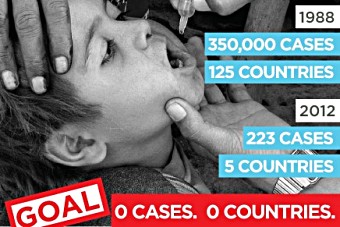
Geneva, 11 April 2013 – GAVI CEO Dr. Seth Berkley has joined hundreds of scientists, doctors and technical experts from around the world to launch the Scientific Declaration on Polio Eradication.
The initiative is designed to highlight the achievability of polio eradication and endorse the Eradication and Endgame Strategic Plan, a new strategy by the Global Polio Eradication Initiative (GPEI) to reach the end of polio by 2018.
Closer than ever to eradication
The world is closer than ever to eradicating polio, with just 223 cases of polio in five countries in 2012.
Signatories to the Declaration hail from more than 75 countries and include Nobel laureates, vaccine and infectious disease experts, public health school deans, paediatricians and other health authorities.
Smallpox
Supporters include scientists and doctors who worked on the frontlines of ending smallpox, the only other disease to be eradicated. For additional information about the Scientific Declaration, including a full list of signatories, please visit the Emory Vaccine Center Website.
Foundation for delivery of lifesaving vaccines
The Eradication and Endgame Strategic Plan incorporates a plan to transfer the infrastructure and expertise of the polio programme, such as its state-of-the-art monitoring and surveillance systems and its experience with hard-to-reach populations, to other global health initiatives. This lays the foundation for the delivery of lifesaving vaccines and other health interventions to millions of children.
Edge of eradication
- India, long-regarded as the most difficult place to end polio, has not recorded a case in more than two years.
- The total number of polio cases worldwide dropped steeply in 2012, from 650 in 2011 to 223 in 2012 – the fewest cases in the fewest countries on record.
- Despite political insecurity, the number of children reached with the polio vaccine in northern Nigeria, Pakistan, and Helmand and Kandahar in Afghanistan has increased dramatically over the past 18 months.
